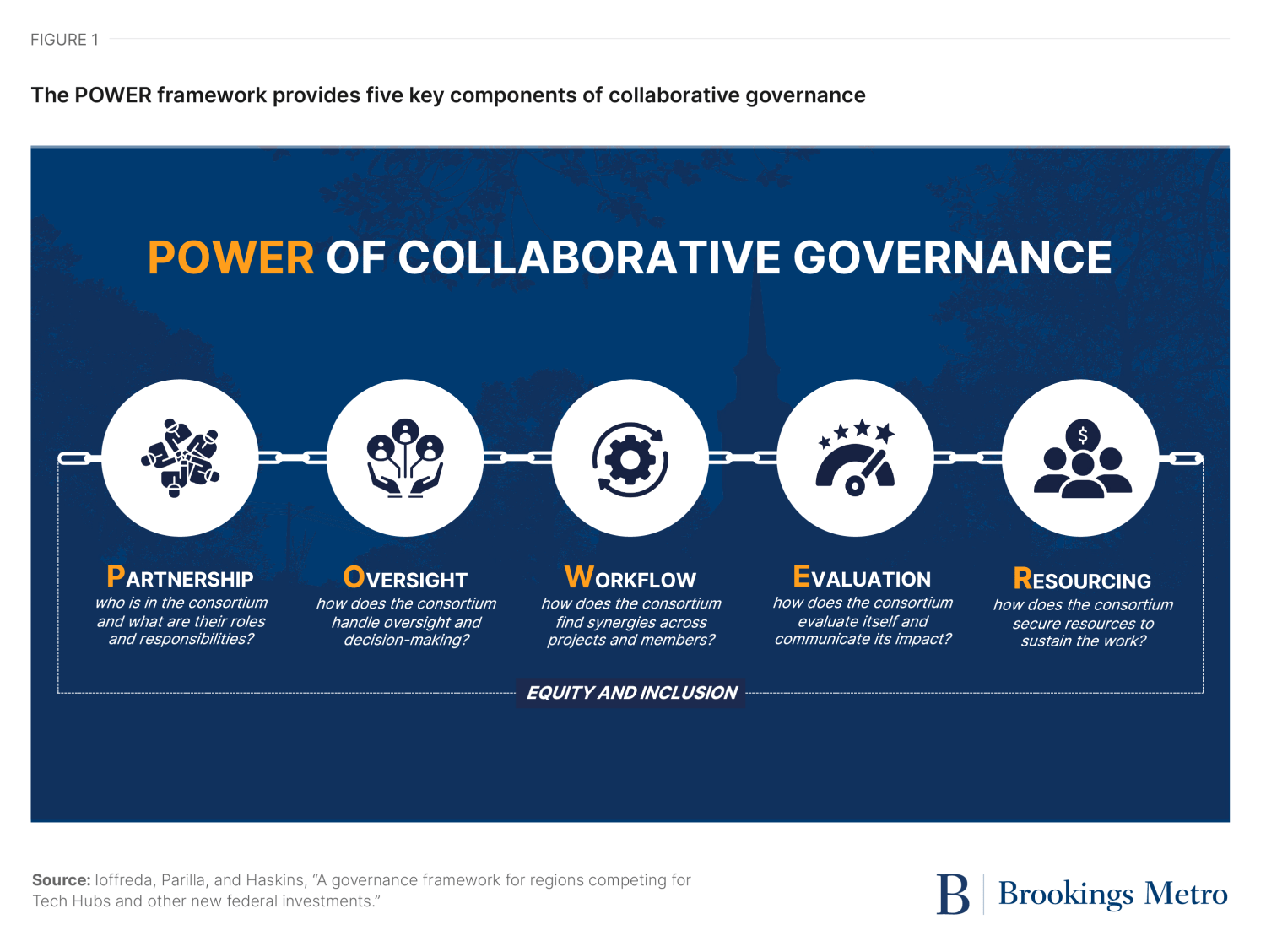Today, after an exhaustive multi-year development and award process, the U.S. Economic Development Administration (EDA) announced implementation awards for the Regional Technology and Innovation Hubs program (Tech Hubs). Starting now, these Hubs are the newest focal points for the nation’s recent efforts to boost high-potential tech clusters in new places.
Envisioned by Brookings Metro and others in 2019 and funded through the 2022 CHIPS and Science Act, the new awards represent a downpayment on an authorized (but under-appropriated) $10-billion program to spread the benefits of tech-fueled growth to more places across the U.S. map.
In October 2023, the EDA selected 31 Tech Hubs designees from a pool of 379 applications, making them eligible for multi-year implementation awards. Now, the EDA has provided implementation grants of between $19 million and $51 million to 12 consortia to execute their locally developed plans for achieving global economic prominence in a key industry within 10 years. Those funds will support focused cluster strategies, accelerate commercial scale-up, and develop the workforce of the future, all while achieving key national goals, such as securing America’s national security, strengthening its supply chain resilience, and improving economic inclusion.
As such, the new awards stand out as especially prominent elements of the nation’s ongoing, multi-program drive in recent years to boost national economic development by leveraging what we call “place-based industrial policy,” the idea that intentional efforts to unlock growth in new places represents a plausible strategy for boosting the nation’s technological advantages, global competitiveness, and national security.
Given all of this, then, it is worth pausing to consider this week’s announcement and take a brief look at the nature of the awards (and the winning consortium organizers) as well as what’s next for the program. Here are three initial takeaways.
Tech Hubs awards are supporting a diverse array of geographies, technologies, and institutions
By statute, the EDA needed to select Tech Hubs from across the entirety of the country, with specific minimum requirements for rural participation. As a result, we see a quite diverse geographic map. Tech Hubs implementation awards are clearly trying to broaden the nation’s geography of innovation, landing in a mix of well-established regional business hubs (e.g., Indianapolis, Milwaukee); university towns (e.g., Urbana-Champaign, Ill., Madison, Wis., ); and more emergent hubs of advanced industries (e.g., Bozeman, Mont., Greenville, S.C., Tulsa, Okla.). Of the 12 Hubs receiving implementation awards, 10 are supporting small and rural communities, according to EDA. Conversely, only two awardees are among the 20 largest U.S. metropolitan areas (Denver and Miami).
The program has identified high-potential clusters in 10 key technology focus areas, such as artificial intelligence, biotechnology, and other advanced technologies, which are crucial for generating economic value and advancing U.S. interests in geopolitical competition, climate change, and economic security. With congressional funding allocations well below the original requested threshold, the EDA is seeking to fund precise interventions that can have potentially bigger ripple effects – both for the advancement of key national technologies and missions and the advancement of economic growth and opportunity in the funded region.
For example, Montana’s diverse geographic landscape and emerging cluster of photonics firms makes it an ideal location to develop and deploy smart sensing systems, with many applications for defense, resource management, and disaster response. Greater Akron, Ohio—nicknamed the rubber capital of the world—received an implementation grant to develop and manufacture more sustainable polymers, a breakthrough required in order to meet broader climate goals. With domestic semiconductor manufacturing a top priority for the Biden-Harris administration, a New York coalition received an implementation grant to support the competitiveness of small and mid-sized semiconductor manufacturing suppliers.
The Tech Hubs awards provide another reminder of the diversity of institutions which are required to execute inclusive economic development. Lead institutions of the 12 awarded consortia include research universities, innovation and cluster intermediaries, state economic agencies, local governments, and regional business organizations. With equity and inclusion highly emphasized in the competition, 75% of awarded coalitions have participation from labor organizations, 25% have participation from Historically Black Colleges and Universities, 25% have participation from Hispanic Serving Institutions, and 25% are partnering with Tribal governments.
Nearly all the Tech Hubs received support for governance projects to strengthen consortium coordination
Acknowledging how important it is for Hubs to have the resources required to coordinate activities, strategies, investments, and progress, the EDA evaluated each region on its “governance, leadership, and evaluation” approach and made funding available for specific projects focused on Hub administration, management, and coordination.
Building on our early evaluation of BBBRC implementation, we developed the “POWER” framework, to help regional leaders organize and govern these complex place-based economic strategies and coalitions. Regions took this to heart and articulated Hub models that emphasized their partnership, oversight, workflow management, evaluation, and resourcing strategies consistent with their unique geography and consortia dynamics. Of the 52 funded projects across the 12 Tech Hubs winners, 10 are focused on strengthening consortium coordination.

For example, Tulsa’s Hub for Equitable & Trustworthy Autonomy (THETA) designed leadership and advisory structures to facilitate stakeholder alignment and tap into regional expertise. These structures include a Steering Committee to oversee alignment between THETA’s vision and activities, Project Working Groups to drive the implementation of each Hub project, and a Technical Advisory Committee to advise the consortium on future innovations.
South Florida’s ClimateReady Tech Hub focused on equity and inclusion in its consortia representation, community engagement, and impact measurement. To address climate change’s disproportionate effect on underserved communities, the Hub outlines an Equity Action Plan that will proactively engage underserved communities to inform its strategic priorities, resource allocation, policies, and performance management, and has ensured that a majority (56%) of its members and Hub partners are leaders of color.
In lower population locations like Montana and Nevada, where lead applicants had to establish and maintain partnerships over long distances, awardees emphasized consistent and intentional communications strategies.
With implementation funding soon to be in hand, these Tech Hubs will need to execute against their plans – rallying consortium and community members, codifying governance structures, and calibrating their original strategies to available funding. The strength of each Tech Hub is found in its diverse coalition with a shared big bet – now they must move from transformational potential to realization through thoughtful implementation.
Next must come strong steps to maximize the Hubs’ impact
Regarding the big picture over the coming years, the way forward now entails enhancing the implementation and impact of the new grants.
Strengthening the program in the coming years is critical, to start with, because the current Tech Hubs initiative—authorized as a $10 billion program in the FY2023 budget—is currently substantially smaller than was originally envisioned for a program aimed at the wholesale transformation of regional economies. It is good, therefore, that President Biden has included $4 billion for the program in his current budget request. And it is also essential that the U.S. Congress use every tool at its disposal in the coming years to fully fund the Tech Hubs program at its authorized level.
But the program should not be expanded just to hit an arbitrary size. Rather, it should be leveraged and bolstered to make it a powerful demonstration of a joint federal-local effort to scale up the delivery of critical technologies while accelerating inclusive regional economic growth. In this way, the Tech Hubs program has a chance to break ground on additional plans to build partnerships across the government—and beyond it—and unlock additional benefits of hub designation for these communities. These supports, along with brokering ongoing relationships between the hubs and policymakers, industry stakeholders, and follow-on capital, could go a long way toward bulking up the impact of the hubs.
All of this future coordination matters hugely: strong execution of this “whole of government” push on economic and regional transformation could help ensure the hub initiative also transforms federal execution and the nation’s broader economic development in the years to come. Ultimately, that’s the true significance of the Tech Hubs announcement this week.





